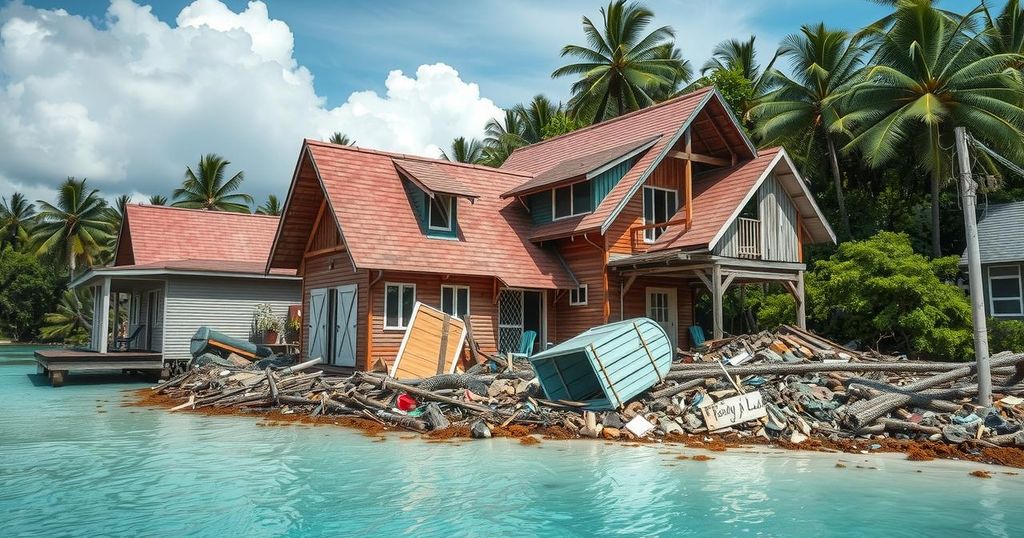Tropical Cyclone Chido wreaked havoc across Mayotte, Comoros, and Mozambique, causing extensive damage and fatalities. Shortly after, a 7.3-magnitude earthquake struck Vanuatu, compounding disasters for vulnerable populations. Direct Relief is assessing the needs and providing medical support to affected communities in both regions, emphasizing the long-term health risks posed by such natural calamities.
Over the past weekend, Tropical Cyclone Chido inflicted devastating damage on the Mayotte archipelago, Comoros, and Mozambique along the southeastern African coast, resulting in significant loss of life and destruction. Following this calamity, a 7.3-magnitude earthquake struck Vanuatu, compounding the hardships faced by communities already grappling with vulnerabilities exacerbated by recent disasters. Cyclone Chido, noted as the most potent storm to hit Mayotte in nine decades, reached wind speeds topping 140 miles per hour, and storm surges inundated neighborhoods, particularly informal settlements accommodating undocumented migrants. Although the current reported death toll stands at 22, casualty estimates are projected to rise as additional damage assessments take place.
Cyclone Chido similarly wreaked havoc in Comoros, prompting President Azali Assoumani to declare a week of mourning for those lost amid extensive infrastructural damage. Similarly, Mozambique, already under threat from severe weather, faced winds exceeding 160 miles per hour and copious rainfall that devastated homes, infrastructure, and healthcare facilities. In light of these disasters, Direct Relief has mobilized its resources to evaluate the needs of the affected populations. In Mayotte, they are collaborating with French emergency response agencies, while in Comoros, they are working alongside their partner Santé Diabète to provide necessary support.
In the Pacific, the aftermath of the earthquake in Vanuatu is unfolding, with initial reports indicating widespread destruction to public and private infrastructures, particularly healthcare facilities. Direct Relief is coordinating with local healthcare partners to identify urgent needs, ensuring that emergency medical supplies are en route to this stricken nation. Natural disasters such as these earthquakes and cyclones pose immediate and lengthy threats to public health. Consequences include mass injuries, widespread disease outbreaks from contaminated floodwaters, and increased vulnerability for displaced populations under compromised living conditions.
With an unwavering commitment to disaster response, Direct Relief has a prestigious history of providing crucial medical resources in the wake of significant natural disasters. They have previously delivered substantial medical aid to Mozambique following Cyclone Idai, and answered urgent calls for assistance in the wake of earthquakes in Türkiye and Syria, as well as the Nepal earthquake in 2015. This organization pre-positions medical supplies in anticipation of future cyclone and hurricane seasons across high-risk regions, ensuring timely medical assistance to communities in dire need.
As the repercussions of Cyclone Chido and the earthquake in Vanuatu continue to evolve, Direct Relief remains dedicated to supporting healthcare providers while assisting communities in recovery and guaranteeing that essential medical care reaches those affected.
Tropical Cyclone Chido and a recent earthquake in Vanuatu illustrate the severe impact of natural disasters on vulnerable communities. Cyclone Chido, one of the strongest storms impacting Mayotte in a century, resulted in significant infrastructure damage, particularly in informal settlements. The cyclone also affected nearby Comoros and Mozambique, which are prone to extreme weather events. Concurrently, a 7.3-magnitude earthquake hit Vanuatu, exacerbating existing vulnerabilities. Organizations such as Direct Relief have dedicated themselves to providing disaster-response assistance, ensuring vital medical resources reach impacted populations during such emergencies.
In conclusion, Cyclone Chido and the subsequent earthquake in Vanuatu have led to catastrophic outcomes for many communities, showcasing the urgent need for disaster-response measures. Direct Relief’s prompt actions underline the importance of coordinated humanitarian efforts in the aftermath of such calamities. These natural disasters not only lead to immediate crises but also pose long-term threats to public health, necessitating continuous support and resources for those affected. Through strategic partnerships and resource mobilization, Direct Relief aims to mitigate the impact of these disasters and foster community recovery.
Original Source: www.directrelief.org






